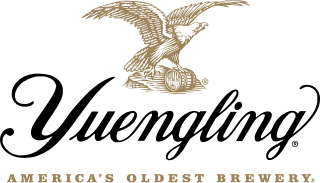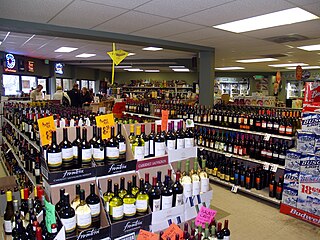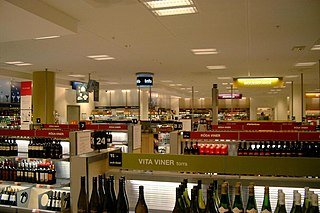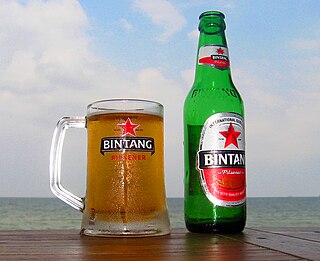Related Research Articles

Prohibition is the act or practice of forbidding something by law; more particularly the term refers to the banning of the manufacture, storage, transportation, sale, possession, and consumption of alcoholic beverages. The word is also used to refer to a period of time during which such bans are enforced.

D. G. Yuengling & Son, established in 1829, is the oldest operating brewing company in the United States. In 2018, by volume of sales, it was the largest craft brewery, sixth largest overall brewery and largest wholly American-owned brewery in the United States. Its headquarters are in Pottsville, Pennsylvania. In 2015, Yuengling produced about 2.9 million barrels, operating two Pennsylvania facilities and a brewery in Tampa, Florida.

Mohan Meakin is a large group of companies which started with Asia's first brewery incorporated in 1855 by Edward Dyer at Kasauli in the Himalayan Mountains in India under the name Dyer Breweries.

In the United Kingdom, a tied house is a public house required to buy at least some of its beer from a particular brewery or pub company. That is in contrast to a free house, which is able to choose the beers it stocks freely.
Beer in India has been prepared from rice or millet for thousands of years. In the 18th century, the British introduced European beer to India. Beer is not as popular as stronger alcoholic beverages like desi daru and Indian-made foreign liquor, such as Indian whiskey. The most popular beers in India are strong beers.

In the United States, beer is manufactured in breweries which range in size from industry giants to brew pubs and microbreweries. The United States produced 196 million barrels (23.0 GL) of beer in 2012, and consumes roughly 28 US gallons (110 L) of beer per capita annually. In 2011, the United States was ranked fifteenth in the world in per capita consumption, while total consumption was second only to China.

A liquor store is a retail business that predominantly sells prepackaged alcoholic beverages, including liquors, wine or beer, usually intended to be consumed off the store's premises. Depending on region and local idiom, they may also be called an off-licence, off-sale, bottle shop, bottle store or, colloquially, bottle-o, liquor store or other similar terms. A very limited number of jurisdictions have an alcohol monopoly. In US states that are alcoholic beverage control (ABC) states, the term ABC store may be used.
Murree Brewery is a Pakistani multinational manufacturer of alcoholic and non-alcoholic beverages. It is Pakistan's largest and oldest producer of alcoholic products. In 2015, it produced 10 million litres of beer, along with hundreds of tons of single malt whisky, vodka and brandy. Founded by the British in 1860, it is a publicly traded company listed on the Pakistan Stock Exchange, and its products are exported to India and Bangladesh. In 2014, the company established a flagship store on Park Avenue, in Manhattan, New York City. In 2013, it was named by Forbes as one of Asia's 200 best companies.

The G. Heileman Brewing Company of La Crosse, Wisconsin, United States, was a brewer that operated from 1858 to 1996. It was ultimately acquired by Stroh's. From 1872 until its acquisition, the brewery bore the family name of its co-founder and brewer Gottlieb Heileman.

Beer in Asia began when beer was produced in Sumer, Mesopotamia circa 6000 years ago. It was introduced by Europeans in the 19th century, with modern breweries established in British India, the Dutch East Indies, China, and Japan. Asia's first modern brewery was established in 1830 in India entirely using European brewing technology.

An alcohol monopoly is a government monopoly on manufacturing and/or retailing of some or all alcoholic beverages, such as beer, wine and spirits. It can be used as an alternative for total prohibition of alcohol. They exist in all Nordic countries except Denmark proper, and in all provinces and territories in Canada except Alberta. In the United States, there are some alcoholic beverage control states, where alcohol wholesale is controlled by a state government operation and retail sales are offered by either state or private retailers.

Kasauli Brewery and Distillery, at Kasauli in Solan district of Himachal Pradesh state of India, was established in late 1920s during the British Raj by Edward Abraham Dyer. It started producing Asia's first beer brand, the "Lion Beer", and India's first single malt whisky, the ""Solan No. 1". Both of these brands are still in production. After the swap of brewery at Kasauli to Solan distillery and vice versa in 1835, presently Lion beer is produced at Solan and Solan No.1 whisky is produced at the Kasauli distillery using some of the original equipment including the copper pot still. The production of Lion beer was moved 25 km east to Solan Brewery at Solan, due to water scarcity, after civilian Kasauli hill station resort town came up around the brewery. Lion beer was originally an India Pale Ale (IPA), but the beer style was changed to lager in 1960s.

Alcohol has been consumed in New Zealand since the arrival of Europeans. The most popular alcoholic beverage is beer. The legal age to purchase alcohol is 18. New Zealand has an above average consumption rate of alcohol, in 2016 ranking 32nd globally in per-capita total alcohol consumption.

Alcohol laws are laws relating to manufacture, use, being under the influence of and sale of alcohol or alcoholic beverages. Common alcoholic beverages include beer, wine, (hard) cider, and distilled spirits. Definition of alcoholic beverage varies internationally, e.g., the United States defines an alcoholic beverage as "any beverage in liquid form which contains not less than one-half of one percent of alcohol by volume". Alcohol laws can restrict those who can produce alcohol, those who can buy it, when one can buy it, labelling and advertising, the types of alcoholic beverage that can be sold, where one can consume it, what activities are prohibited while intoxicated, and where one can buy it. In some cases, laws have even prohibited the use and sale of alcohol entirely.

Alcohol is prohibited in the states of Bihar, Gujarat, Mizoram, and Nagaland. All other Indian states and union territories permit the sale of alcohol.
The legal drinking age in India and the laws which regulate the sale and consumption of alcohol vary significantly from state to state. In India, consumption of alcohol is prohibited in the states of Bihar, Gujarat, Nagaland, and Mizoram, as well as the union territory of Lakshadweep. There is partial ban on alcohol in some districts of Manipur. All other Indian states permit alcohol consumption but fix a legal drinking age, which ranges at different ages per region. In some states the legal drinking age can be different for different types of alcoholic beverage.

Desi daru, also known as country liquor or Indian-made Indian liquor (IMIL), is a category of liquor made in the countryside of the Indian subcontinent. It is traditionally prepared by a procedure that has been passed down for centuries. Due to cheap prices, country liquor is the most popular alcoholic beverage among the impoverished people. It is fermented and distilled from molasses, a by-product of sugarcane. Desi liquor is a broad term and it can include both legally and illegally made local alcohol. The term desi daru usually refers to legal alcohol while other types of country liquor may be categorised as moonshine alcohol.

Alcohol in Indonesia refers to the alcohol industry, alcohol consumption and laws related to alcohol in the South East Asian country of Indonesia. Indonesia is a Muslim majority country, yet it is also a pluralist, democratic and secular nation. These social and demographic conditions led to Islamic parties and pressure groups pushing the government to restrict alcohol consumption and trade, while the government carefully considers the rights of non-Muslims and consenting adults to consume alcohol, and estimates the possible alcohol ban effects on Indonesian tourism and the economy.
Beer distribution worldwide has several different steps, ranging from the production of supplies used in the making of beer to selling it in stores, with many separate interactions in between. In general, beer distribution can be shown by a three tiered or two tiered model of distribution, with most of the world partaking in the latter.
References
- ↑ "Beer in Pakistan". Euromonitor.com. Retrieved 2015-08-04.
- ↑ "Pakistan's Murree Beer, Pakistan's Legendary Beer". iCohol.com. 2013-01-10. Retrieved 2015-08-04.
- ↑ Crilly, Rob (2011-01-06). "Pakistan brewery's beer battle with India". Telegraph. Retrieved 2015-08-04.
- 1 2 Foreman, Jonathan (2012-03-24). "Ale under the veil: the only brewery in Pakistan". Telegraph. Retrieved 2015-08-04.
- ↑ Matthew Pennington, Associated Press writer (June 19, 2005). "Business Is Hopping at Pakistan's Only Legal Brewery - latimes". Articles.latimes.com. Retrieved 2015-08-04.
- 1 2 Bari, Mavra (2021-04-22). "Pakistan's alcohol prices surge during coronavirus pandemic". Asia. Deutsche Welle English. Archived from the original on 2021-04-23.
- ↑ Paracha, Nadeem F. "The curious history of prohibition (and alcohol consumption) in Pakistan". Scroll.in. Retrieved 2020-12-28.